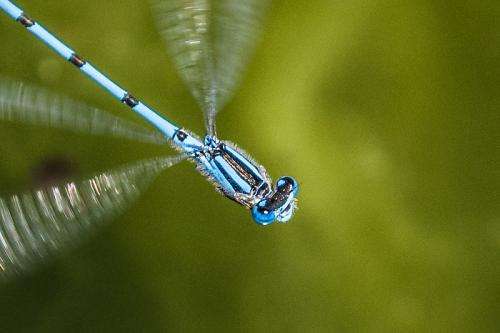Insects' fear limits boost from climate change, study shows

Scientists often measure the effects of temperature on insects to predict how climate change will affect their distribution and abundance, but a Dartmouth study shows for the first time that insects' fear of their predators, in addition to temperature, ultimately limits how fast they grow.
"In other words, it's less about temperature and more about the overall environmental conditions that shape the growth, survival and distribution of insects." says the study's lead author Lauren Culler, an Arctic postdoctoral researcher at Dartmouth.
The study appears in the journal Oecologia.
Animals live in a constantly changing physical and biological environment, and the fear of being eaten can drastically alter their behavior, physiology, growth and population dynamics. That fear, known as the "flight-or-fight" response, can prompt physiological responses that stunt their growth and reproductive capability, either because they spend less time foraging for food and more time hiding or because they produce anti-predator defenses that can be energetically costly.
Previous studies have shown that warming temperatures make insects eat more and grow faster. The Dartmouth study looked at how fear, which typically lowers food consumption and growth rate, affects an insects' response to warming temperatures. They brought damselflies into the lab and measured how much they ate and grew at different temperatures and how that changed when a fish predator was nearby. They used an experimental setup in which a damselfly was floated in a glass vial and exposed visually and chemically to a fish predator.
The results showed that in the absence of fear, the damselflies ate more food and grew faster as the temperature increased. Surprisingly, however, when a fish predator was looming, the damselflies ate about the same amount of food but grew much more slowly. The researchers aren't sure what happens to the food that doesn't go into growth, but they think it gets lost in the anti-predator response, possibly to production of stress proteins.
"Studies that aim to predict the consequences of climate change on insect populations should consider additional factors that may ultimately limit growth and survival, such as the risk of being eaten by a predator," Culler says.
More information: Oecologia, link.springer.com/article/10.1 … 07/s00442-014-3058-8
Journal information: Oecologia
Provided by Dartmouth College

















